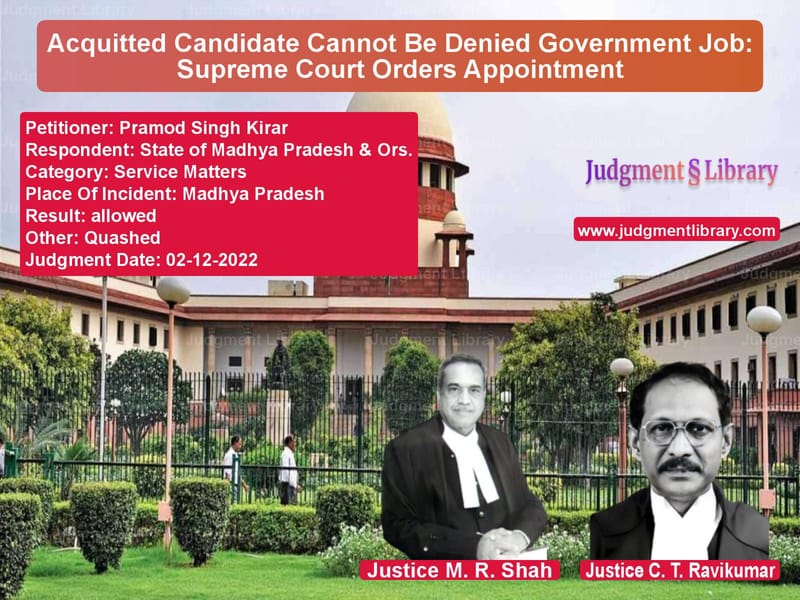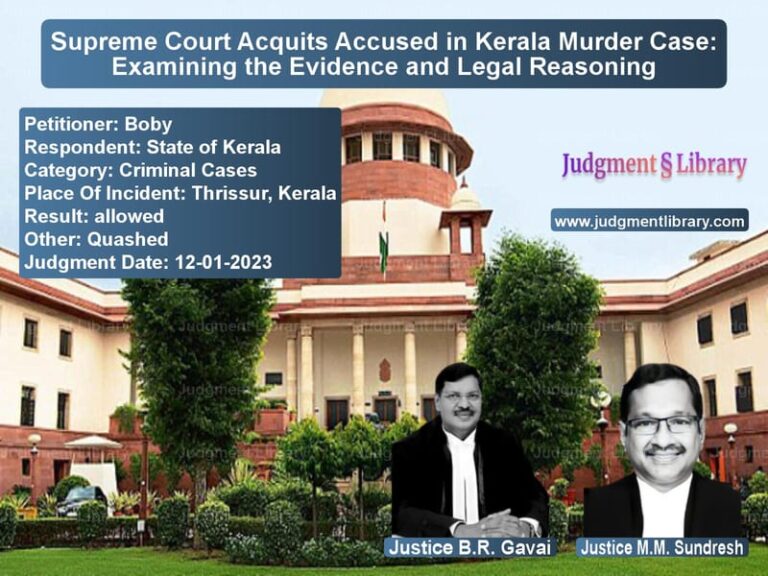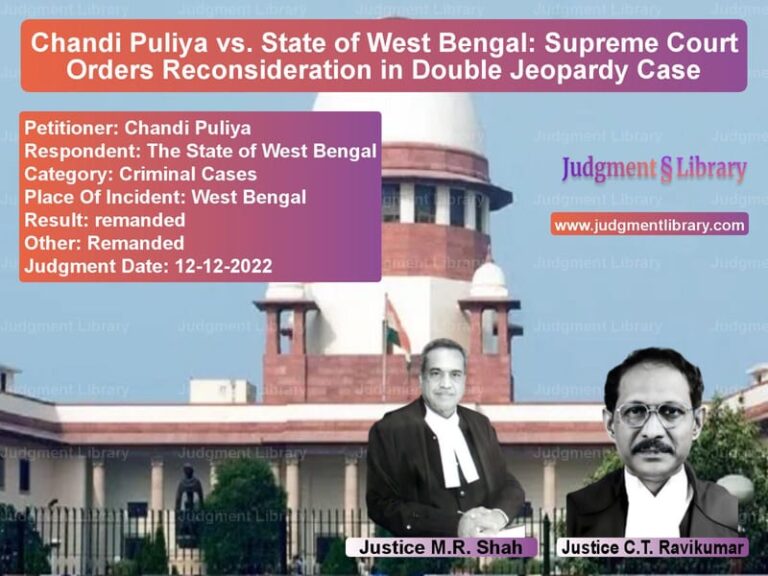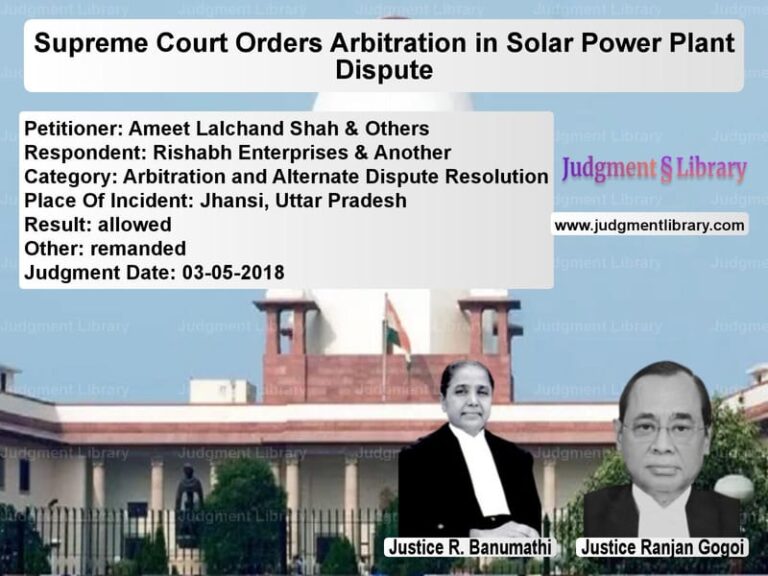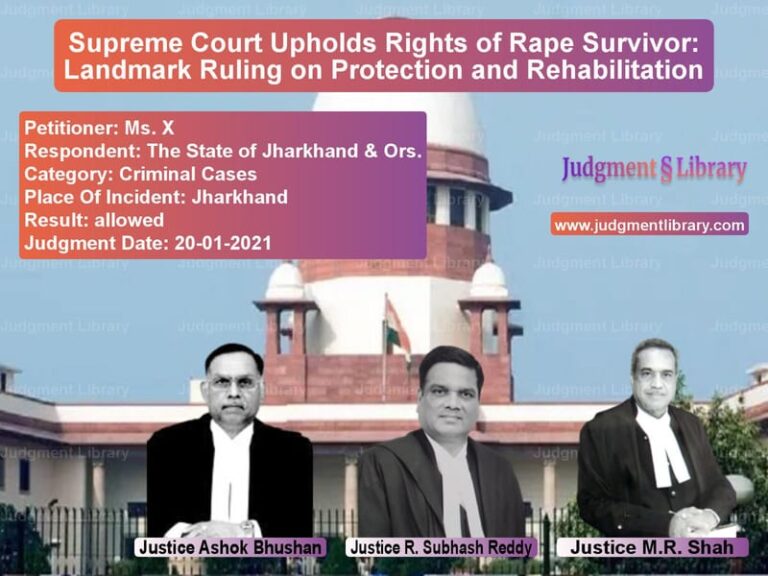Acquitted Candidate Cannot Be Denied Government Job: Supreme Court Orders Appointment
The Supreme Court of India recently ruled in the case of Pramod Singh Kirar vs. State of Madhya Pradesh & Ors., addressing the issue of whether a candidate acquitted of criminal charges can be denied a government job. The Court held that an acquitted candidate cannot be denied employment, especially when the criminal case involved a minor offense arising from a matrimonial dispute and resulted in acquittal years before the recruitment process.
The judgment is a crucial precedent for public employment and recruitment policies, reaffirming that a past legal accusation, particularly one leading to acquittal, cannot be an absolute bar to government service.
Background of the Case
The case arose when the appellant, Pramod Singh Kirar, applied for the post of Police Constable in 2013 but was denied employment due to a past criminal case. The key timeline of events was as follows:
- 2001: The appellant was accused under Section 498A of the IPC in a matrimonial dispute.
- 2006: He was acquitted by the trial court following a settlement.
- 2013: The appellant applied for a constable position in the Madhya Pradesh police force.
- 2014: His candidature was rejected on the grounds of his past criminal record.
- 2017: The Madhya Pradesh High Court’s Single Judge Bench ruled in his favor and ordered his appointment.
- 2020: The Division Bench of the High Court overturned the Single Judge’s decision, holding that the state had the right to deny employment based on past criminal involvement.
- 2022: The Supreme Court set aside the Division Bench’s ruling and ordered the appellant’s appointment.
Arguments by the Appellant (Pramod Singh Kirar)
The appellant’s counsel presented the following arguments:
- The criminal case was a matrimonial dispute that ended in acquittal through mutual settlement.
- The appellant had fully disclosed his past case in the job application and did not conceal any information.
- The rejection of his candidature was arbitrary and unfair, given that he was found meritorious in the selection process.
- The High Court’s Division Bench ignored his right to employment despite being acquitted long before his job application.
Arguments by the Respondents (State of Madhya Pradesh)
The state government opposed the appellant’s claim, arguing:
- Even if a candidate has been acquitted, the government retains the discretion to assess character and antecedents before appointing a police officer.
- The rejection was justified as police personnel must have an impeccable record to serve in law enforcement.
- The High Court’s Division Bench correctly ruled that an employer has the right to reject candidates based on past criminal involvement.
Supreme Court’s Judgment
The Supreme Court ruled in favor of the appellant and held:
- There was no suppression of facts by the appellant, as he truthfully disclosed his past case.
- The case under Section 498A of IPC was a minor matrimonial dispute that resulted in acquittal years before he applied for the job.
- The appellant had demonstrated good character and conduct over the years, qualifying for public service.
- The rejection of his employment was arbitrary and should be reversed.
Key Precedents Cited
The Supreme Court relied on multiple landmark cases, including:
- Avtar Singh vs. Union of India (2016): Held that an acquitted candidate cannot be automatically denied a government job.
- Rajasthan Rajya Vidyut Prasaran Nigam Ltd. vs. Anil Kanwariya (2021): Stressed that suppression of criminal history can be a ground for rejection, but full disclosure protects a candidate.
- State of Madhya Pradesh vs. Abhijit Singh Pawar (2018): Reaffirmed the principle that employers must consider the nature of the offense before rejecting a candidate.
Impact of the Judgment
This Supreme Court ruling has several major implications:
- Protects the rights of acquitted individuals: Ensures that a past accusation does not permanently bar employment.
- Ensures fairness in recruitment: Employers cannot arbitrarily reject candidates without considering the nature of the past case.
- Establishes legal clarity: Government employers must provide proper reasoning before denying jobs to individuals with past cases.
Conclusion
The Supreme Court’s ruling in Pramod Singh Kirar vs. State of Madhya Pradesh & Ors. reinforces the principle that an acquitted individual cannot be denied employment arbitrarily. The judgment upholds the right to fair consideration in public employment and ensures that past allegations, especially those arising from domestic disputes, do not unfairly impact a person’s future.
The verdict sets an important precedent for future recruitment cases, ensuring that all government hiring decisions are made on fair and reasonable grounds.
Petitioner Name: Pramod Singh Kirar.Respondent Name: State of Madhya Pradesh & Ors..Judgment By: Justice M. R. Shah, Justice C. T. Ravikumar.Place Of Incident: Madhya Pradesh.Judgment Date: 02-12-2022.
Don’t miss out on the full details! Download the complete judgment in PDF format below and gain valuable insights instantly!
Download Judgment: pramod-singh-kirar-vs-state-of-madhya-prad-supreme-court-of-india-judgment-dated-02-12-2022.pdf
Directly Download Judgment: Directly download this Judgment
See all petitions in Employment Disputes
See all petitions in Public Sector Employees
See all petitions in Judgment by Mukeshkumar Rasikbhai Shah
See all petitions in Judgment by C.T. Ravikumar
See all petitions in allowed
See all petitions in Quashed
See all petitions in supreme court of India judgments December 2022
See all petitions in 2022 judgments
See all posts in Service Matters Category
See all allowed petitions in Service Matters Category
See all Dismissed petitions in Service Matters Category
See all partially allowed petitions in Service Matters Category

